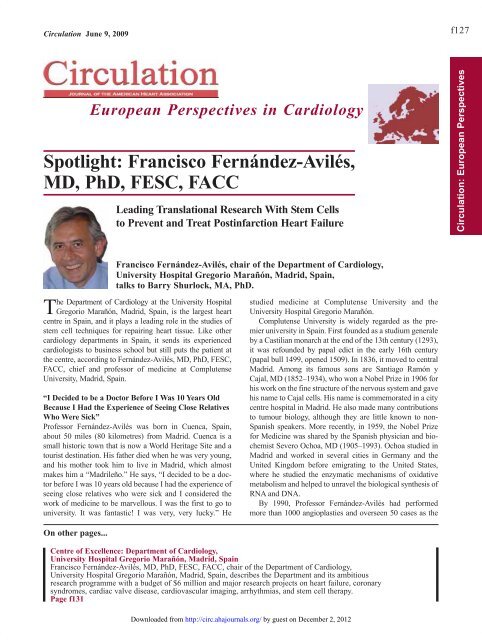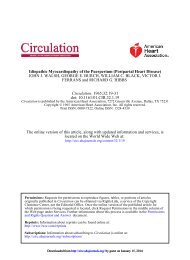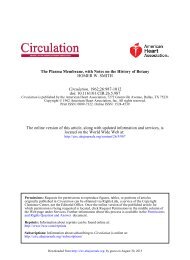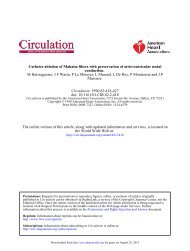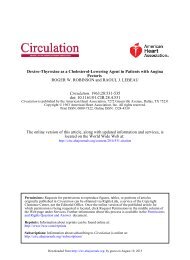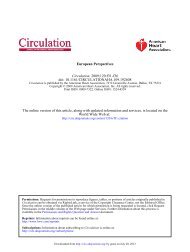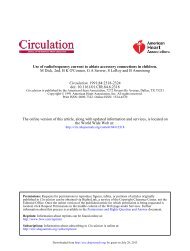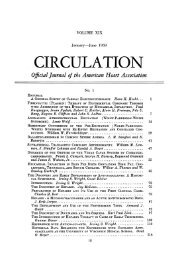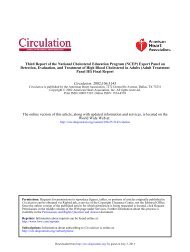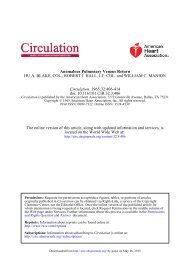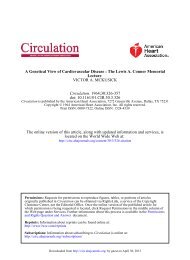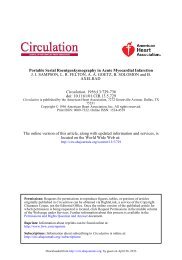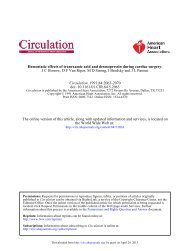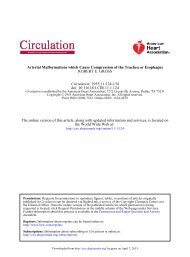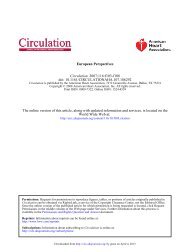Francisco Fernández-Avilés, MD, PhD, FESC, FACC - Circulation
Francisco Fernández-Avilés, MD, PhD, FESC, FACC - Circulation
Francisco Fernández-Avilés, MD, PhD, FESC, FACC - Circulation
Create successful ePaper yourself
Turn your PDF publications into a flip-book with our unique Google optimized e-Paper software.
<strong>Circulation</strong> June 9, 2009<br />
On other pages...<br />
European Perspectives in Cardiology<br />
Spotlight: <strong>Francisco</strong> <strong>Fernández</strong>-<strong>Avilés</strong>,<br />
<strong>MD</strong>, <strong>PhD</strong>, <strong>FESC</strong>, <strong>FACC</strong><br />
Leading Translational Research With Stem Cells<br />
to Prevent and Treat Postinfarction Heart Failure<br />
<strong>Francisco</strong> <strong>Fernández</strong>-<strong>Avilés</strong>, chair of the Department of Cardiology,<br />
University Hospital Gregorio Marañón, Madrid, Spain,<br />
talks to Barry Shurlock, MA, <strong>PhD</strong>.<br />
The Department of Cardiology at the University Hospital<br />
Gregorio Marañón, Madrid, Spain, is the largest heart<br />
centre in Spain, and it plays a leading role in the studies of<br />
stem cell techniques for repairing heart tissue. Like other<br />
cardiology departments in Spain, it sends its experienced<br />
cardiologists to business school but still puts the patient at<br />
the centre, according to <strong>Fernández</strong>-<strong>Avilés</strong>, <strong>MD</strong>, <strong>PhD</strong>, <strong>FESC</strong>,<br />
<strong>FACC</strong>, chief and professor of medicine at Complutense<br />
University, Madrid, Spain.<br />
“I Decided to be a Doctor Before I Was 10 Years Old<br />
Because I Had the Experience of Seeing Close Relatives<br />
Who Were Sick”<br />
Professor <strong>Fernández</strong>-<strong>Avilés</strong> was born in Cuenca, Spain,<br />
about 50 miles (80 kilometres) from Madrid. Cuenca is a<br />
small historic town that is now a World Heritage Site and a<br />
tourist destination. His father died when he was very young,<br />
and his mother took him to live in Madrid, which almost<br />
makes him a “Madrileño.” He says, “I decided to be a doctor<br />
before I was 10 years old because I had the experience of<br />
seeing close relatives who were sick and I considered the<br />
work of medicine to be marvellous. I was the first to go to<br />
university. It was fantastic! I was very, very lucky.” He<br />
studied medicine at Complutense University and the<br />
University Hospital Gregorio Marañón.<br />
Complutense University is widely regarded as the premier<br />
university in Spain. First founded as a studium generale<br />
by a Castilian monarch at the end of the 13th century (1293),<br />
it was refounded by papal edict in the early 16th century<br />
(papal bull 1499, opened 1509). In 1836, it moved to central<br />
Madrid. Among its famous sons are Santiago Ramón y<br />
Cajal, <strong>MD</strong> (1852–1934), who won a Nobel Prize in 1906 for<br />
his work on the fine structure of the nervous system and gave<br />
his name to Cajal cells. His name is commemorated in a city<br />
centre hospital in Madrid. He also made many contributions<br />
to tumour biology, although they are little known to non-<br />
Spanish speakers. More recently, in 1959, the Nobel Prize<br />
for Medicine was shared by the Spanish physician and biochemist<br />
Severo Ochoa, <strong>MD</strong> (1905–1993). Ochoa studied in<br />
Madrid and worked in several cities in Germany and the<br />
United Kingdom before emigrating to the United States,<br />
where he studied the enzymatic mechanisms of oxidative<br />
metabolism and helped to unravel the biological synthesis of<br />
RNA and DNA.<br />
By 1990, Professor <strong>Fernández</strong>-<strong>Avilés</strong> had performed<br />
more than 1000 angioplasties and overseen 50 cases as the<br />
Centre of Excellence: Department of Cardiology,<br />
University Hospital Gregorio Marañón, Madrid, Spain<br />
<strong>Francisco</strong> <strong>Fernández</strong>-<strong>Avilés</strong>, <strong>MD</strong>, <strong>PhD</strong>, <strong>FESC</strong>, <strong>FACC</strong>, chair of the Department of Cardiology,<br />
University Hospital Gregorio Marañón, Madrid, Spain, describes the Department and its ambitious<br />
research programme with a budget of $6 million and major research projects on heart failure, coronary<br />
syndromes, cardiac valve disease, cardiovascular imaging, arrhythmias, and stem cell therapy.<br />
Page f131<br />
Downloaded from<br />
http://circ.ahajournals.org/ by guest on December 2, 2012<br />
f127<br />
<strong>Circulation</strong>: European Perspectives


